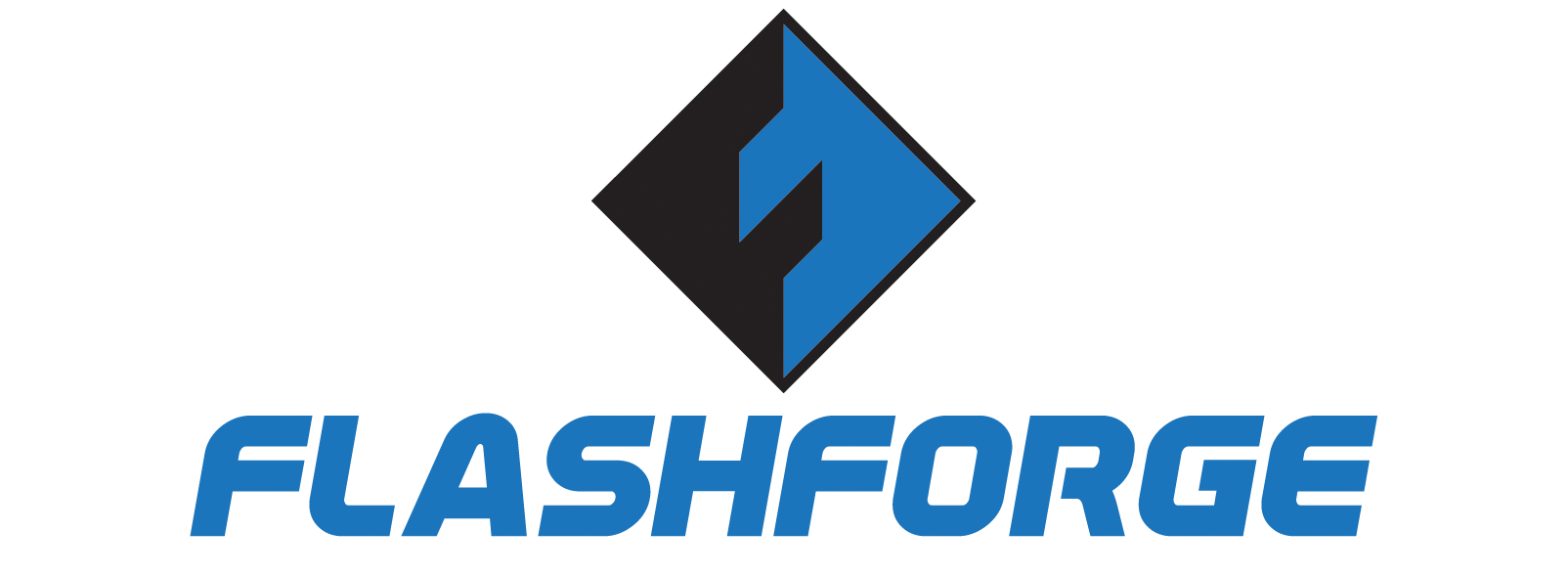Prusa Research is rooted in the open-source RepRap movement (a global initiative to develop self-replicating 3D printers) and has built its legacy on trust, community involvement, and exceptional long-term reliability. Founded by Josef Prusa in 2012, the company focuses on delivering meticulously engineered machines like the Original Prusa MK4, Mini+, and Prusa XL—printers that are known for stability, precision, and long-lasting value.
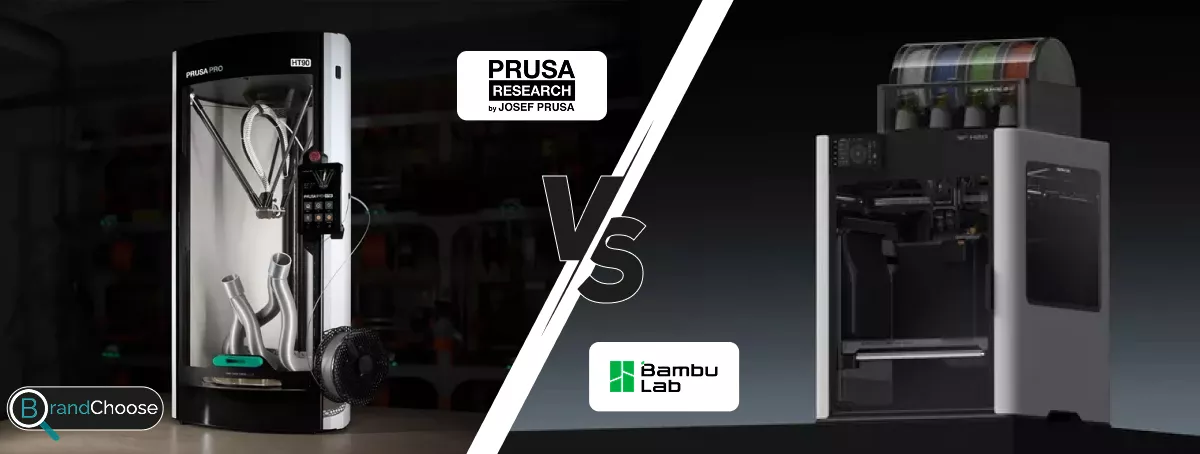
Bambu Lab, by contrast, is a new and bold player that has disrupted the consumer 3D printing space with polished, high-speed machines. Created by former DJI engineers (the team behind DJI drones), Bambu brings an appliance-like user experience to the table, with features like LIDAR calibration (a laser-based system for scanning and adjusting the print bed), active vibration compensation (real-time motion control to reduce shaking), and the AMS system (Automatic Material System, which enables multi-material or multi-color printing through automatic filament switching).
Prusa champions user control and community-driven development; Bambu Lab focuses on automation, speed, and seamless integration.
Product Selection
🟦 Prusa is a premium open-source brand with a reputation for engineering excellence, reliability, and support. With models like the MK4 and XL, it’s built for users who care about print quality, longevity, and an active ecosystem. For more information in detail, visit the Prusa review page.
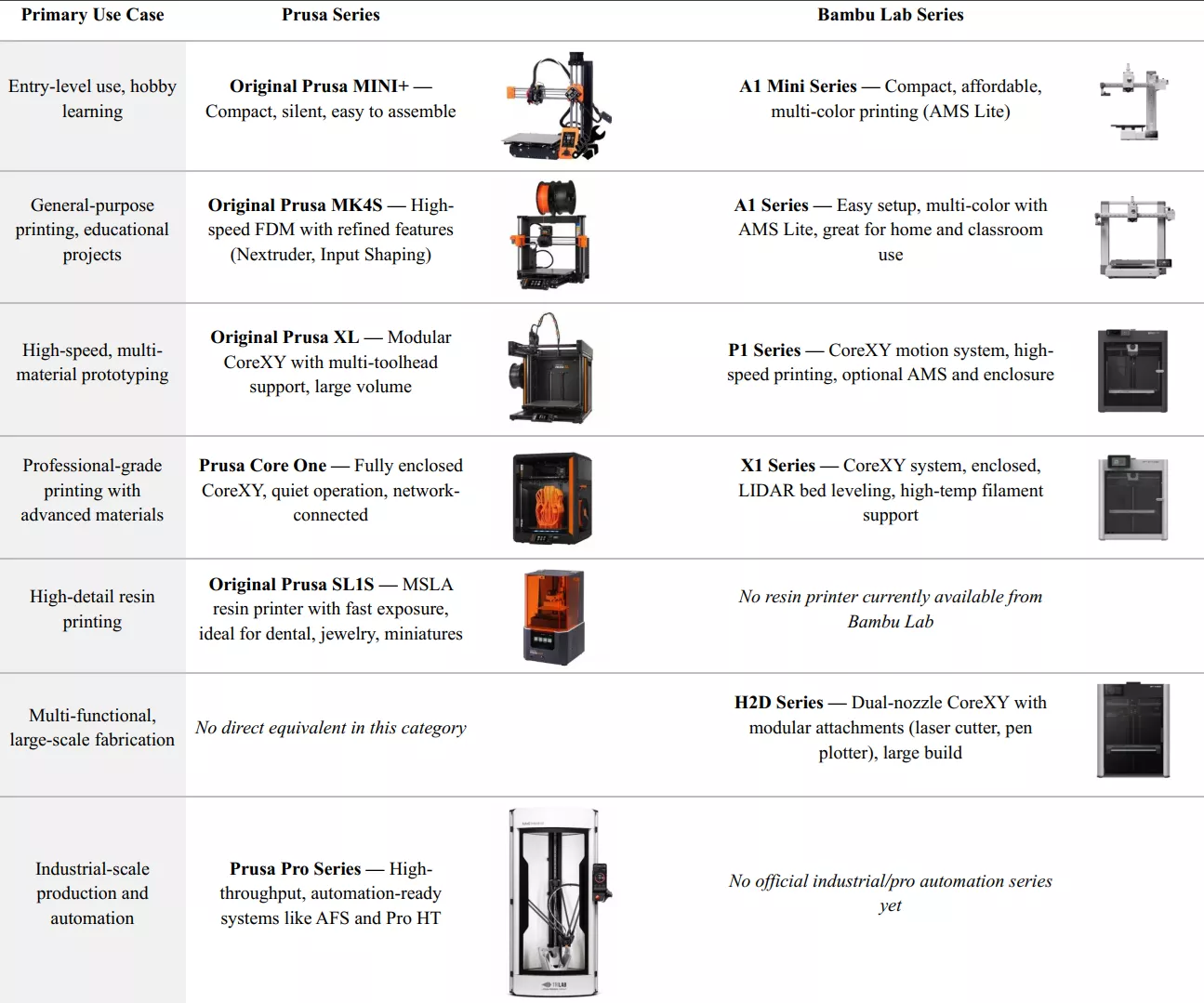
🟪 Bambu Lab brings a sleek, high-tech approach to 3D printing — fast, smart, and beginner-friendly. With innovations like LIDAR calibration and the AMS system, it’s perfect for prosumers and professionals who want speed without tinkering. For more information in detail, visit the Bambu Lab review page.
Ease of Use
🟦Prusa printers are well-documented and feature crash detection and filament sensors, yet kit versions need more hands-on assembly and calibration—rewarding for tinkerers but slower for true beginners.
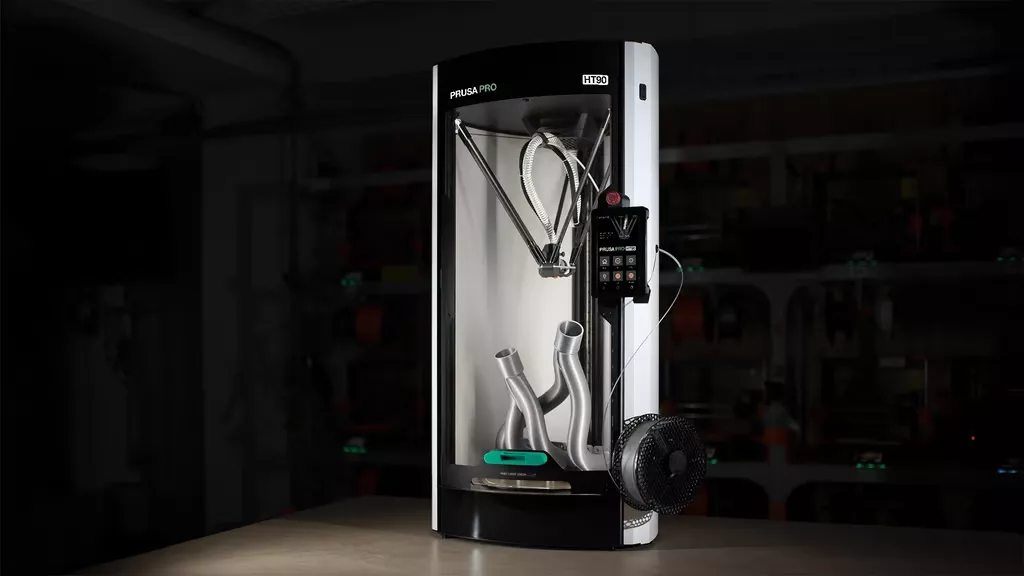
🟪Bambu Lab models arrive ready within minutes. Auto-levelling, flow calibration, remote monitoring, and pre-tuned Bambu Studio profiles flatten the learning curve almost completely.

✅Bambu Lab is the easiest for complete novices; Prusa suits learners who enjoy a little extra hands-on involvement.
Cost & Affordability
🟦Prusa’s MK4 starts near $1 000, and a fully-kitted XL can top $2 000, but long lifespan, support, and resale value make the investment worthwhile for dedicated users.
🟪Bambu Lab delivers exceptional value: the A1 Mini Combo (sub-$300) includes multi-colour printing, while X1 Carbon bundles range $600–$1 200—heavy on features for the price.
✅Bambu Lab offers more cutting-edge features per dollar; Prusa provides better long-term value and support.
Print Quality & Speed
🟦Prusa printers such as the MK3S+ and MK4 focus on consistency over outright speed. Mesh bed levelling and finely-tuned PrusaSlicer profiles deliver superb first-layer reliability and clean finishes. The Prusa XL adds a faster CoreXY motion system, yet most of the range still balances moderate speed with extremely high precision.
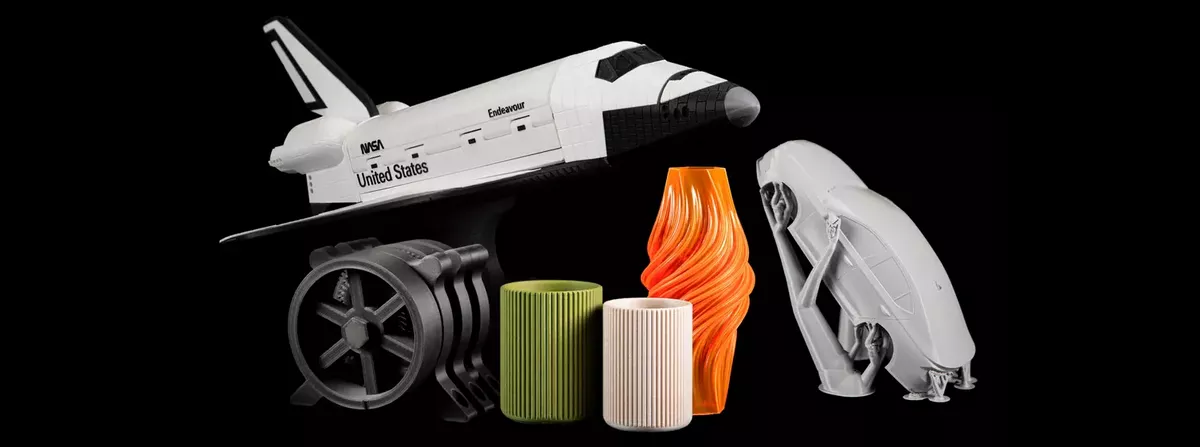
🟪Bambu Lab printers such as the X1-Carbon and P1P are built for speed straight out of the box, comfortably running at 250–300 mm/s (and more) while vibration control preserves quality. Prints remain impressively clean, considering the pace.
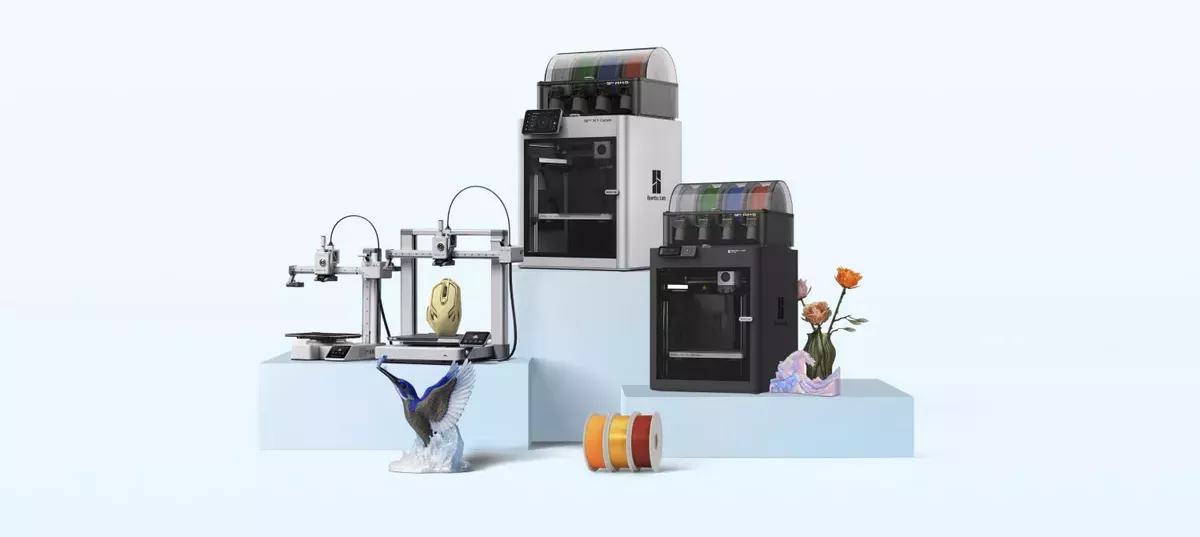
✅Prusa leads in quality at moderate speeds; Bambu Lab combines very high speed with surprisingly strong detail.
Material Compatibility
🟦All-metal hotends and heated beds let Prusa machines print PLA, PETG, ABS, ASA, TPU, PC blends, and Nylon. Open filament policies plus Prusament quality control make exotic material exploration easy.
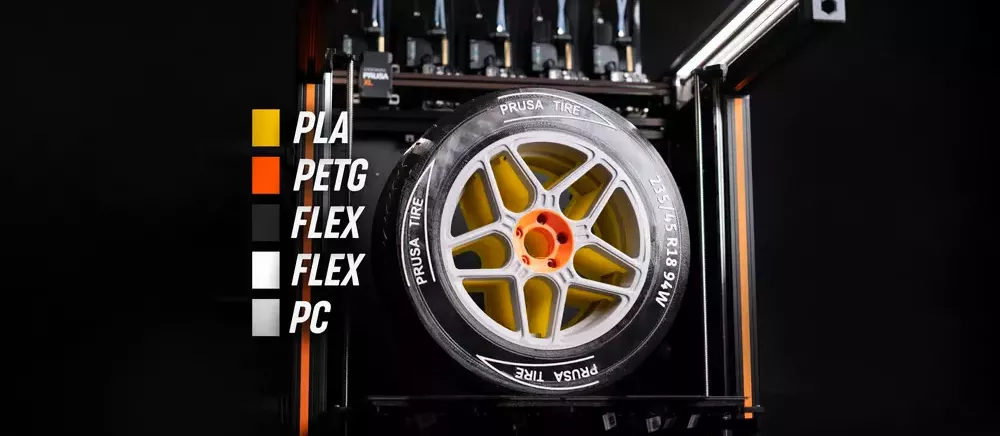
🟪Bambu Lab prints the usual consumer filaments and tougher options such as ABS, PA, and carbon-fibre blends. Peak performance appears when using the enclosed chamber and AMS with Bambu-branded spools; third-party materials work but demand extra profile tuning, especially for multi-material jobs.

✅Prusa offers greater freedom for material experimentation; Bambu Lab shines when you stay inside its curated ecosystem.
Build Volume & Variety
🟦Prusa’s tight but effective range spans the compact Mini+, the desktop-standard MK4, and the spacious XL (360 × 360 × 360 mm with multi-tool capability).
🟪Bambu Lab currently offers mid-sized machines—P1P, X1-Carbon, A1 Mini—from 180 mm to 256 mm cubed, with no large-format option yet.
✅Prusa covers more size categories; Bambu Lab is limited to mid-sized use cases for now.
Reliability & Durability
🟦Strict QC and modular, open designs give Prusa printers (e.g. MK3S+) reputations for thousands of trouble-free hours in schools and prototyping labs.
🟪Bambu Lab hardware is rugged and tolerates high-speed loads, though some users report occasional firmware or AMS quirks—usually patched quickly.
✅Prusa edges ahead on long-term mechanical and firmware stability; Bambu Lab is solid but occasionally needs software updates.
Maintenance
🟦Prusa offers easy access to PEI beds, hotends, fans, and fully open firmware—ideal for users comfortable swapping parts or performing upgrades.
🟪Bambu Lab’s modular parts simplify day-to-day upkeep, but deeper repairs—especially around the AMS—are more involved and proprietary.
✅Prusa is easier to self-service; Bambu Lab is lower-maintenance daily but harder to hack when issues arise.
Technology & Features
🟦Prusa opts for refined, proven tech—removable spring-steel beds, MMU multi-material upgrade, open-source firmware, and industry-leading PrusaSlicer.
🟪Bambu Lab packs cutting-edge features: LIDAR first-layer inspection, AMS multi-material, cloud printing, silent CoreXY motion, and AI-assisted monitoring.
✅Bambu Lab wins on high-tech integration; Prusa excels in rock-solid, open-source functionality.
Who Should Choose Which Brand?
🟦Go with Prusa if you are:
- A serious hobbyist, educator, or prototyper seeking long-term reliability and open control
- Comfortable with hands-on setup and occasional tweaking
- Interested in multi-material upgrades within a fully open-source ecosystem
- Looking for high resale value backed by years of proven support
🟪Go with Bambu Lab if you are:
- A busy professional, designer, or beginner who values plug-and-play simplicity
- After fast, clean prints with minimal setup
- Excited by features like LIDAR, AMS, and smart automation
- Willing to trade some openness for ecosystem cohesion and speed
Conclusion
Each brand delivers excellent results, but they cater to different mindsets. If you value openness, upgradability, and long-term community-driven support, Prusa is the go-to choice. If you prioritize speed, automation, and a seamless, modern printing experience, Bambu Lab stands out as the top contender.







